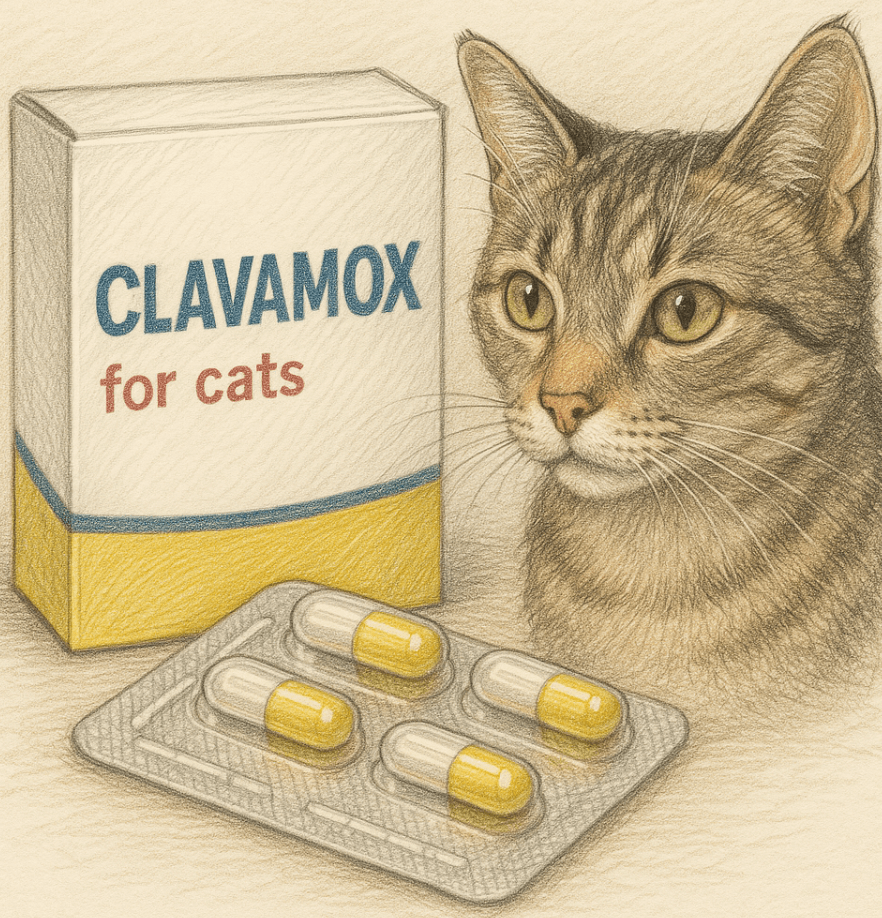Clavamox for Cats: What You Need to Know
When it comes to treating infections in cats, Clavamox is one of the most commonly prescribed antibiotics by veterinarians. This powerful medication is designed to combat a wide range of bacterial infections, from skin issues to urinary tract problems. However, as a responsible cat owner, it’s essential to understand how Clavamox works, its potential side effects, and how to administer it safely. In this blog post, we’ll explore everything you need to know about using Clavamox for cats, ensuring your feline friend receives the best care possible while minimizing risks. Whether you’re new to this medication or looking for expert tips, this guide will help you navigate its use with confidence.
What Is Clavamox and How Does It Work?
Clavamox is a broad-spectrum antibiotic that combines two active ingredients: amoxicillin and clavulanic acid. Together, these components target and eliminate harmful bacteria in cats, making it highly effective for treating various infections. Here’s a breakdown of how Clavamox works and why it’s trusted by veterinarians.
Broad-Spectrum Coverage:
Clavamox targets both Gram-positive and Gram-negative bacteria, addressing a wide variety of infections effectively.Amoxicillin Component:
Amoxicillin disrupts the cell walls of bacteria, preventing them from growing and spreading.Clavulanic Acid Boost:
Clavulanic acid enhances the effectiveness of amoxicillin by inhibiting enzymes that some bacteria produce to resist antibiotics.Common Uses:
Clavamox is often prescribed for skin infections, dental abscesses, respiratory issues, and urinary tract infections in cats.Prescription-Only Medication:
Clavamox must be prescribed by a veterinarian after a proper diagnosis to ensure safe and appropriate use.
Understanding how Clavamox works highlights its importance as a reliable treatment option for bacterial infections in cats.
Benefits of Using Clavamox for Cats
Clavamox offers several advantages when used correctly under veterinary guidance. Its versatility and effectiveness make it a go-to choice for many feline health issues.
Fast-Acting Relief:
Many cats show improvement within a few days of starting Clavamox, providing quick relief from painful symptoms.Easy Administration Options:
Available in tablets, chewable pills, and liquid form, Clavamox can be tailored to suit your cat’s preferences and needs.Minimal Resistance Development:
The combination of amoxicillin and clavulanic acid reduces the likelihood of bacteria developing resistance compared to single-component antibiotics.Wide Range of Applications:
From superficial wounds to internal infections, Clavamox addresses diverse bacterial conditions effectively.Veterinarian-Approved Safety:
When prescribed and administered properly, Clavamox is generally safe and well-tolerated by most cats.
These benefits underscore why Clavamox is a trusted solution for managing bacterial infections in cats, ensuring faster recovery and improved quality of life.
Check this guide 👉Is Anthurium Safe for Cats? Best 7 Expert Tips!
Check this guide 👉Penicillin for Cats: Best 7 Health Tips!
Check this guide 👉Is Hypoestes Safe for Cats? Best 7 Health Tips!

Pros of Clavamox for Cats | Cons of Clavamox for Cats |
|---|---|
Effective against a wide range of bacteria | Possible side effects like vomiting or diarrhea |
Fast-acting and reliable results | Requires a prescription; not available over-the-counter |
Easy to administer (tablets, liquid) | Overuse may lead to antibiotic resistance |
Minimal risk of severe adverse reactions | May not work on viral or fungal infections |
Trusted and approved by veterinarians | Cost may vary depending on dosage and form |
How to Administer Clavamox Safely to Your Cat
Administering medication to a cat can be challenging, but following these guidelines ensures your cat receives the full benefits of Clavamox without unnecessary stress.
Follow Dosage Instructions Carefully:
Always adhere to the dosage prescribed by your veterinarian, as overdosing can lead to serious complications.Choose the Right Form:
If your cat resists swallowing pills, ask your vet about liquid Clavamox or hiding pills in treats or soft food.Complete the Full Course:
Even if your cat seems better before finishing the medication, complete the entire course to prevent recurring infections.Monitor for Side Effects:
Watch for signs of adverse reactions, such as loss of appetite, lethargy, or digestive upset, and contact your vet if they occur.Store Properly:
Keep Clavamox in a cool, dry place, away from direct sunlight, and out of reach of children and pets.
By following these steps, you can ensure your cat’s treatment is both effective and stress-free.
Signs That Your Cat May Need Clavamox
Recognizing the symptoms of bacterial infections early can help your veterinarian determine if Clavamox is the right treatment for your cat. Look out for these common signs.
Skin Irritations or Sores:
Redness, swelling, or open wounds on the skin may indicate a bacterial infection requiring Clavamox.Frequent Sneezing or Coughing:
Respiratory infections often present with persistent sneezing, coughing, or nasal discharge.Difficulty Urinating:
Straining to urinate or blood in the urine could signal a urinary tract infection treatable with Clavamox.Swollen Gums or Bad Breath:
Dental infections, such as abscesses, may cause noticeable swelling or unpleasant odors in your cat’s mouth.Lethargy and Loss of Appetite:
General signs of illness, combined with localized symptoms, warrant a vet visit to assess the need for antibiotics.
Identifying these signs early ensures timely treatment and a quicker recovery for your cat.
Common Side Effects of Clavamox in Cats
While Clavamox is generally safe, some cats may experience mild side effects during treatment. Being aware of these reactions helps you respond promptly if they occur.
Vomiting or Nausea:
Some cats may vomit shortly after taking Clavamox, especially if given on an empty stomach.Diarrhea or Loose Stools:
Digestive upset is a common side effect but usually resolves once the treatment ends.Loss of Appetite:
A temporary decrease in appetite may occur, though persistent refusal to eat requires veterinary attention.Lethargy or Fatigue:
Cats may seem unusually tired or less active during the course of treatment.Allergic Reactions (Rare):
Symptoms like swelling, hives, or difficulty breathing indicate an allergy and necessitate immediate vet care.
Most side effects are mild and manageable, but always consult your vet if you notice anything concerning.
Tips for Managing a Picky Eater During Clavamox Treatment
Administering medication to a picky eater can be tricky, but these tips can make the process smoother for both you and your cat.
Mix with Strong-Smelling Foods:
Hide Clavamox tablets or liquid in tuna, chicken broth, or wet food to mask the taste.Use Pill Pockets:
Commercially available pill pockets are flavored treats designed to conceal medication easily.Crush and Blend (If Approved):
Ask your vet if crushing the tablet and mixing it into food is safe for your cat.Offer Rewards Afterward:
Provide a favorite treat or toy immediately after dosing to create positive associations.Try Liquid Alternatives:
If pills are too difficult, request liquid Clavamox, which can be syringed directly into your cat’s mouth.
With patience and creativity, you can overcome challenges posed by picky eaters during treatment.
Preventing Future Infections After Clavamox Treatment
Once your cat has recovered, taking preventive measures can reduce the risk of future infections requiring antibiotics like Clavamox.
Maintain Good Hygiene:
Regular grooming and cleaning of your cat’s living space help minimize exposure to harmful bacteria.Provide a Balanced Diet:
A nutritious diet supports your cat’s immune system, making them less susceptible to infections.Schedule Routine Vet Check-Ups:
Regular examinations allow early detection of potential health issues before they escalate.Keep Up with Vaccinations:
Staying current on vaccinations protects your cat from diseases that could weaken their immune system.Avoid Stressful Environments:
Minimize stressors at home, as stress can compromise your cat’s immunity and increase infection risks.
Proactive care ensures your cat remains healthy and reduces the need for repeated antibiotic treatments.
Frequently Asked Questions About Clavamox for Cats
Can I give my cat Clavamox without a vet’s prescription?
No, Clavamox requires a veterinary diagnosis to ensure it’s the right treatment for your cat’s condition.
What should I do if my cat vomits after taking Clavamox?
Contact your vet immediately, as vomiting may indicate an adverse reaction or improper dosage.
How long does it take for Clavamox to work?
Most cats show improvement within 2-3 days, but the full course of medication should always be completed.
Are there alternatives to Clavamox for cats?
Yes, other antibiotics may be prescribed depending on the type and severity of the infection.
Can Clavamox treat viral infections like FIV or FeLV?
No, Clavamox only treats bacterial infections and is ineffective against viruses.
Prioritizing Your Cat’s Health with Clavamox
Clavamox is a highly effective antibiotic that can significantly improve your cat’s health when used responsibly. By understanding its uses, benefits, and potential risks, you can ensure your feline companion receives the best care possible. Always consult your veterinarian before starting any medication, and follow their instructions closely to achieve optimal results. With proper administration and monitoring, Clavamox can help your cat recover quickly and return to their playful, happy self. Remember, your vigilance and care are key to keeping your furry friend healthy and thriving.
Fluoxetine for Dogs: Best 7 Expert Tips! Discover expert advice on using fluoxetine safely, managing side effects, and improving your dog’s mental health effectively.
Megaesophagus in Dogs: Best 7 Expert Tips! Discover expert advice on symptoms, management, and care to improve your dog's quality of life with this challenging condition.
Giant Schnauzer Dog: Best 7 Expert Tips! Discover expert advice on training, grooming, and living with this intelligent, loyal breed for a happy and well-behaved companion.
Dog Jerky Recipe: Best 7 Expert Tips! Discover easy, healthy, and safe homemade dog jerky ideas with expert advice on ingredients, preparation, and storage for your pup's delight.




